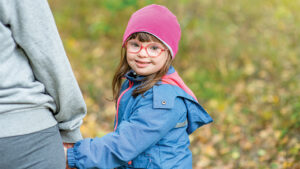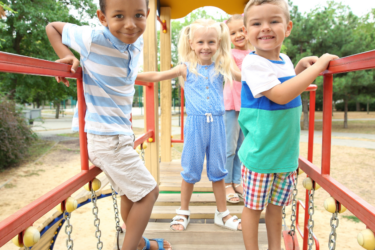One in five children in the United States, or more than 14.5 million total children, has special health care needs such as physical,
developmental, behavioral, or emotional conditions, according to the National Survey of Children’s Health. If you are raising a child with special needs, you know how challenging it can sometimes be.
Whether your child has been diagnosed with autism, ADHD, a learning disability, a visual or hearing impairment, or another disability, something free and available right outside your door can make a difference: nature. A growing number of scientific studies over the past few decades have shown the importance of nature in improving our family’s health and happiness.
Children with special needs can benefit from nature connection, helpingto support their physical, cognitive, emotional, and social development in unique and powerful ways. “Learning to feel calm and grounded in nature is helpful for any child, whether they be ‘typically developing’ or facing extra challenges such as a developmental delay or a physical difference that affects coordination and mobility,” says Lisa Louis, mother of an autistic sonand founder of HikingAutism.com. “Learning to enjoy nature was not only life-changing for our severely challenged son, but for our whole family. We see this with other families as well.”
Discover the many benefits of nature for special needs children and how you can get started to help them connect to nature safely.
BENEFITS OF NATURE CONNECTION
Making time for nature can assist children in endless ways. It can alleviate ADHD symptoms and help children with autism develop their interests and imagination, cope with change, and feel calmer, according to research. Here are some additional benefits of nature for children with special needs:
Non-intrusive sensory experience. Nature presents diverse textures, sounds, sights, and smells that stimulate and soothe the senses, which can be particularly valuable for children with sensory processing disorders or autism.
Improved communication. Playing in natural environments encourages language development and cooperative skills.
Positive social interactions. Time in nature allows for unstructured play and exploration, which helps enhance children’s behavior, boost their independence and self-confidence, and improve how they cope with change. It’s also a great way to connect with other families facing similar challenges.
Increased physical activity. Nature promotes a more active lifestyle, which can be particularly important for those with physical disabilities or motor skill challenges. Activities like hiking, biking, gardening, or simply walking on varied terrain can improve strength, balance, spatial awareness, agility, and coordination.
Cognitive development. The natural world offers manageable opportunitiesto foster imagination; curiosity; and problem-solving, reasoning, and observational skills.
Reduce stress. The serene, often rhythmic, setting of forests, parks, beaches, gardens, and other natural spaces can reduce stress and anxiety, which is especially valuable for children with attention deficit disorders or emotional regulation difficulties.
Improved attention. Nature has been found to help reduce impulsivity and allow children to feel more focused and on-task.
NATURE ACTIVITIES TO GET STARTED
The best outdoor activities for children with special needs are those that cater to their interests and sensory requirements. “Taking walks, whether a short stroll to a neighborhood garden or a longer hike in one of the many national, state, and county parks that offer hiking trails, is the simplest way to get outdoors and experience nature,” says Louis. She also encourages people to simply look out their windows and watch for birds and other wildlife. Growing some herbs or flowers in pots on the front porch is another great project for the family to enjoy together, she says.
- Here are some additional nature activities to try with your children:
- Sensory gardens to stimulate all the senses
- Rock collecting to promote tactile exploration
- Outdoor scavenger hunts to encourage exploration and problem-solving
- Nature crafts using collected objects like leaves, flower petals, and pinecones
- Animal tracking to encourage observation skills, such as installing a birdhouse or
birdfeeder in your yard - Cloud watching to stimulate imaginationand relaxation
- Water play activities like jumping in puddles and visiting lakes and beaches
for a soothing sensory experience - Tree rubbing for creativity and tactile stimulation
- Outdoor yoga to help with body awareness and emotional regulation
- Visit a u-pick farm to pick apples, strawberries, or pumpkins
WHAT TO KEEP IN MIND WHILE HEADING OUTDOORS
While nature can be fun and helpful for children with special needs, it can also be overwhelming. It’s important to take some precautions to ensure a safe and positive experience.
First of all, don’t worry about structuring your child’s outdoor playtime. Of course, stay close by supervising, but let them have some freedom to explore. This type of free play can help them build creativity and problem-solving skills.
Next, assess the physical space to make sure it is safe and comfortable. Start with something simple like playing in your backyard or local park and gradually introduce children to new wild areas over time. Look for spots with equitable access for all abilities, such as accessible paths into natural areas. Also, limit outdoor time when the weather is very hot or cold, and remember to use sunscreen and protective gear.
Watch out for materials that could be harmful, such as poisonous plants, stinging insects, sharp objects like thorns, and anything that could trigger a sensitivity. Always be prepared with necessary medications, insect repellent, assistive devices, and safety equipment like life jackets and helmets. For highly-sensitive children, bringing sunglasses and noise-canceling headphones can be a good idea.
Finally, allow for frequent breaks during the outing, give extra time for transitions, and choose less crowded times to explore public spaces. Always have a safe exit plan in case a child feels overstimulated. No matter how the day goes, remember to celebrate small achievements and let your children know how proud you are of them as they explore new aspects of the natural world.





